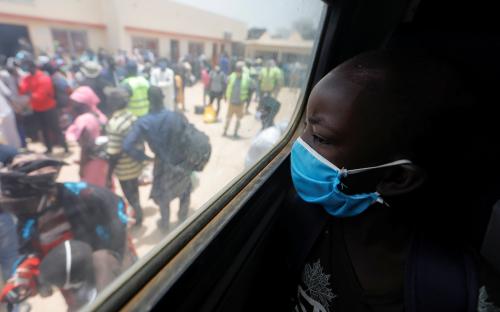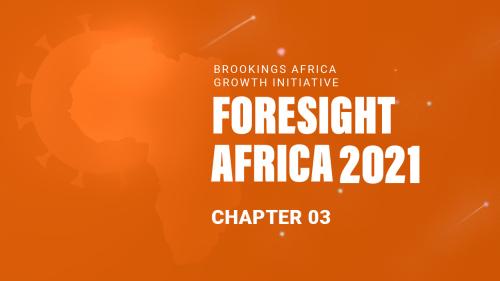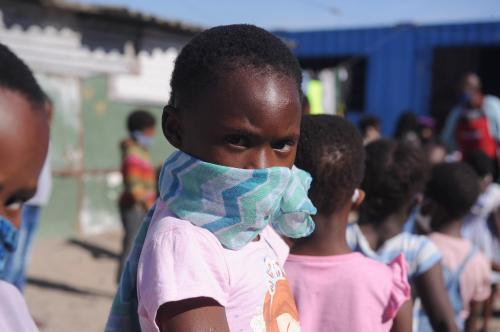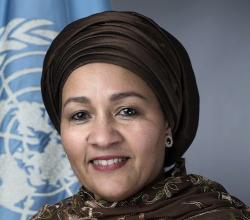Below is a Viewpoint from Chapter 3 of the Foresight Africa 2021 report, which explores top priorities for the region in the coming year. This year’s issue focuses on strategies for Africa to confront the twin health and economic crises created by the COVID-19 pandemic and emerge stronger than ever. Here is one half of the debate on strategies for maintaining momentum toward improved human development outcomes and the role of the Sustainable Development Goals in this new world. See an alternate view.
 We welcomed 2020 with great expectations for Africa’s promising future. Barely three months into the new decade, though, the SARS-CoV-19 virus, through devastating health impacts and resultant lockdowns, has damaged economies, destroyed jobs and livelihoods, reversed development gains, and still threatens to push up to an additional 115 million people back into extreme poverty in 2020 alone. The impacts on the world’s most vulnerable people have been enormous, with twice as many people projected to be at the brink of starvation. Humanitarian needs have skyrocketed by 40 percent this year. Next year, 235 million people worldwide may need humanitarian aid and protection. Progress to improve the lives of people everywhere, through the achievement of the 17 Sustainable Development Goals (SDGs), will be derailed.
We welcomed 2020 with great expectations for Africa’s promising future. Barely three months into the new decade, though, the SARS-CoV-19 virus, through devastating health impacts and resultant lockdowns, has damaged economies, destroyed jobs and livelihoods, reversed development gains, and still threatens to push up to an additional 115 million people back into extreme poverty in 2020 alone. The impacts on the world’s most vulnerable people have been enormous, with twice as many people projected to be at the brink of starvation. Humanitarian needs have skyrocketed by 40 percent this year. Next year, 235 million people worldwide may need humanitarian aid and protection. Progress to improve the lives of people everywhere, through the achievement of the 17 Sustainable Development Goals (SDGs), will be derailed.
The COVID-19 pandemic has exposed the shaky foundations on which the global and regional economy is built and exacerbated deep-seated imbalances in our economic and social structures. However, like any disruptive force, COVID-19 presents us with an opportunity to re-imagine a better future through our response—a fairer and more equal world. The 2030 Agenda for Sustainable Development, which is aligned with the African Union Agenda 2063, remains the best framework for doing just that.
These extraordinary times call for extraordinary measures. Before the pandemic, the financing gap to achieve the Sustainable Development Goals was $2.5 trillion per year. Now, as we set up stimulus packages, the focus must be on directing these unprecedented investments to foster inclusive and sustainable growth, meeting the needs for decent jobs, social protection floors, and connectivity for a green transition and to spur innovation—leaving no one behind.
In this way, recovering better requires drawing lessons from the current pandemic to support and bolster the SDGs. These lessons call for investing in African green transition, including smart agriculture, renewable energy, and sustainable infrastructure, to bounce back better from the current socio-economic crisis, but also to prepare for the threats posed by climate change. By connecting the almost 590 million Africans who are without electricity through renewable energy investments and by developing the infrastructure to connect people and markets, we must build a platform for a sustained green recovery that takes profit of a young, creative labor force, creates jobs and entrepreneurship opportunities, expands human capital, and empowers the digital transformation of the continent.
We must keep an inclusive focus and improve access for girls to education, and youth- and women-led SMEs to markets and financing. Important steps toward this goal include providing financial and technical support to women’s cooperatives and better connecting them to international markets. Moreover, urgent prerequisites to curb the pandemic and build back better include women’s inclusion in decision-making, the fight against gender-based violence, the provision of skills and resources, and social protection systems that take women’s needs into account.
Women and girls are central to achieving each and every one of the 17 SDGs and building a prosperous, resilient future.
We must rethink the financial architecture, with innovations under the Addis Ababa Action Agenda for Financing for Development, with a focus on ending illicit financial flows, notably by strengthening tax administrations and enabling effective tax collection, as well as encouraging international finance to help de-risk private investments needed to accelerate progress towards the SDGs in the Decade of Action. This must be a multi-stakeholder endeavor including the private sector and philanthropic organizations alongside governments and international development partners.
We need to redress the inherent asymmetries in financial markets and ensure a level playing field for countries with good macro fundamentals, no matter the level of development. Since the crisis, only two African countries have been able to access new funds at reasonable terms. Countries with good macro fundamentals have been bypassed and have not been able to refinance their obligations, while developed countries with high debt-to-GDP ratios are able to raise funds in international markets.
With over $11 trillion in assets and $2.3 trillion annually in investments worldwide, public development banks at all levels—multilateral, regional, and national—need to be part of the solution to increase the volume and impact of investment towards recovery and achieving the SDGs and the Paris Agreement. Development banks must play a key role in de-risking investment, crowding in private finance in developing and emerging markets, turning billions into trillions needed to finance the transition to sustainable development.
Now, more than ever before, international cooperation can and must play a crucial role in ensuring that Africa recovers better, implementing the vision of the SDGs during this Decade of Action. Rules and institutions governing trade, finance, and technologies must enable Africa’s aspirations of building a peaceful, secure, and prosperous continent. As U.N. Secretary-General Guterres often reiterates, when Africa succeeds, the world succeeds.








Commentary
The SDGs are our compass for bolstering Africa’s long-term COVID recovery
February 22, 2021